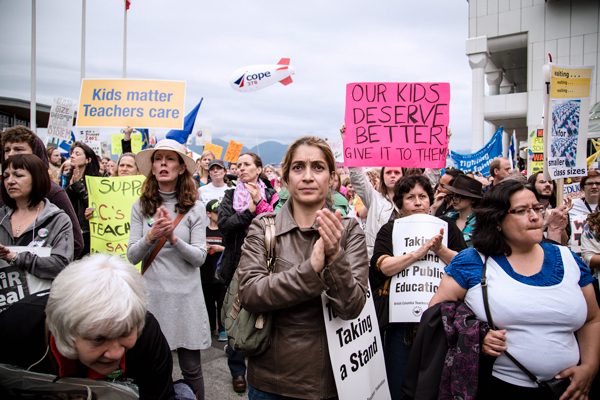The B.C. teachers' union is taking its long fight over class size and composition to the Supreme Court of Canada.
This morning, the country's highest court granted the teachers leave to appeal the 2015 B.C. Court of Appeal decision that found that provincial government legislation imposing contract terms on members of the BC Teachers' Federation in 2012 was constitutional.
That ruling overturned a 2014 B.C. Supreme Court decision that found the 2012 legislation contravened teachers' Charter rights to free collective bargaining, and granted the teachers $2 million in damages from the government.
"The BCTF is very pleased with the Supreme Court of Canada's decision to hear our appeal. It's another important step in this long journey through the court system for us," union president Jim Iker said at a press conference this morning.
In 2002, under then education minister Christy Clark, the province stripped teachers' contracts of the right to negotiate class size and class composition as part of their working conditions, a decision that B.C. Supreme Court Justice Susan Griffin ruled was unconstitutional in 2011.
That decision has not been appealed, but in 2012 the government passed the Education Improvement Act, which left class size and composition limits up to the employer. The union took the government back to the B.C. Supreme Court over the act in 2014 and won.
Their victory was overturned, however, the following year by the B.C. Court of Appeal, whose decision will now be revisited by the Supreme Court of Canada.
"B.C. teachers still have the right to bargain class size and composition," Iker said today, reminding reporters about the uncontested 2011 B.C. Supreme Court decision.
Iker added the union would still use the collective bargaining process to negotiate class size and composition.
Long waiting period
Even with the long waiting period that typically comes with Supreme Court of Canada cases -- Iker expects a hearing will be held in the fall, with the decision coming down next year -- a final ruling on teachers' bargaining rights will still come down before the teachers can return to the bargaining table in 2019.
In a press release today, Education Minister Mike Bernier said he was confident in the government's legal position on the case but, "We've always said that the BCTF's application to have their case heard in the Supreme Court of Canada is part of the democratic process."
While he wouldn't comment further on the specifics of the case, Bernier said that the government's relationship with the union "has never been better" since the last round of bargaining in 2014, which culminated in a negotiated contract after a four-month teachers' strike.
Meanwhile, Iker said that class sizes and the number of special needs and English Language Learning students per class continue to get bigger, while thousands of teaching positions have been cut since 2002.
With provincial enrollment expected to rise this year, including about 1,000 anticipated school-age Syrian refugees, Iker said the government shouldn't wait for the final court decision to invest in education.
"This is the year our government could make a real shift," he said, "and it's time to invest in B.C. kids again." ![]()
Read more: Rights + Justice, Education, Labour + Industry
















Tyee Commenting Guidelines
Comments that violate guidelines risk being deleted, and violations may result in a temporary or permanent user ban. Maintain the spirit of good conversation to stay in the discussion.
*Please note The Tyee is not a forum for spreading misinformation about COVID-19, denying its existence or minimizing its risk to public health.
Do:
Do not: